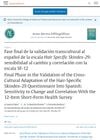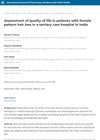 January 2024 in “Medicine”
January 2024 in “Medicine” Hypothyroidism is often linked to the hair loss condition telogen effluvium.
[object Object]  November 2023 in “Indian Dermatology Online Journal”
November 2023 in “Indian Dermatology Online Journal” Tofacitinib was effective for severe, treatment-resistant hair loss without side effects.
 September 2023 in “Dermatology and Therapy”
September 2023 in “Dermatology and Therapy” Baricitinib effectively regrows hair in most people with severe alopecia, especially those with patchy hair loss, but hair may fall out again if treatment stops.
 July 2023 in “Dermatology practical & conceptual”
July 2023 in “Dermatology practical & conceptual” Women with Female Pattern Hair Loss may experience more stress, anxiety, and depression, and have lower levels of BDNF, which could predict the psychological impact.
 4 citations,
August 2019 in “Actas Dermo-Sifiliográficas”
4 citations,
August 2019 in “Actas Dermo-Sifiliográficas” The Spanish HSS-29 scale effectively measures changes in life quality due to female-pattern hair loss.
July 2022 in “Journal of Investigative Dermatology” Scalp clarifying shampoo can help reduce hair loss and improve hair volume.
December 2022 in “Archives of Dermatological Research” Adding cetirizine to minoxidil improves hair growth and thickness in women with androgenetic alopecia.
 95 citations,
July 2016 in “Journal of The American Academy of Dermatology”
95 citations,
July 2016 in “Journal of The American Academy of Dermatology” People with alopecia areata, a skin disease, generally have a poor quality of life, especially if more of their scalp is affected.
 2 citations,
January 2022 in “Lasers in Medical Science”
2 citations,
January 2022 in “Lasers in Medical Science” Using a carbon dioxide laser and platelet-rich plasma together can effectively restore hair and patients are generally satisfied with the results.
[object Object]  April 2024 in “International journal of community medicine and public health/International journall of community medicine and public health”
April 2024 in “International journal of community medicine and public health/International journall of community medicine and public health” Female pattern hair loss greatly lowers quality of life, especially in young women.
 November 2023 in “International Journal of Women's Dermatology”
November 2023 in “International Journal of Women's Dermatology” Hormone replacement therapy may improve hair growth in the frontal hairline of postmenopausal women with hair loss.
 October 2023 in “The Journal of Dermatology”
October 2023 in “The Journal of Dermatology” The HSVS-A is an effective tool for quickly screening hair shedding in Asian women.
 September 2023 in “PubMed”
September 2023 in “PubMed” Baricitinib is a relatively safe and effective treatment for severe alopecia areata.
 January 2023 in “Annals of Dermatology”
January 2023 in “Annals of Dermatology” Men with a family history of hair loss on their mother's side are more likely to have female pattern hair loss.
January 2023 in “Dermatologic Therapy” Androgenetic alopecia significantly affects mental health and quality of life, highlighting the need for psychiatric evaluations.
143 citations,
January 2007 in “The American Journal of Human Genetics” Certain genes on chromosomes 6, 10, 16, and 18 may increase the risk of alopecia areata.
 September 2024 in “Egyptian Journal of Dermatology and Venerology”
September 2024 in “Egyptian Journal of Dermatology and Venerology” Combining TRA and latanoprost is most effective for treating localized alopecia areata.
 March 2024 in “Healthcare”
March 2024 in “Healthcare” Stem cell treatment improved life quality and sexual function in women with hair loss.
 January 2024 in “Annals of Dermatology”
January 2024 in “Annals of Dermatology” Female pattern hair loss greatly affects women's quality of life, causing mild depression and anxiety, and increases medical expenses.
 September 2023 in “Cureus”
September 2023 in “Cureus” Dr. SKS Hair Booster Serum effectively treats hair loss in women with PCOS.
January 2023 in “International Journal of Trichology” Bicalutamide mesotherapy may help with hair loss and seborrhea but needs more research.
October 2022 in “Our Dermatology Online” The Trust tonic is more effective than minoxidil for treating hair loss.
January 2021 in “Medical research archives” The 5% minoxidil lotion without propylene glycol is effective, well-tolerated, and cosmetically acceptable for hair loss.
Combining PRP with a special lotion is more effective for hair loss than PRP alone.
 June 2024 in “Indian Dermatology Online Journal”
June 2024 in “Indian Dermatology Online Journal” Topical tofacitinib is effective and safe for treating alopecia areata.
 September 2024 in “Journal of Cutaneous and Aesthetic Surgery”
September 2024 in “Journal of Cutaneous and Aesthetic Surgery” Bicalutamide may help treat female pattern hair loss.
 9 citations,
December 2020 in “British Journal of Dermatology”
9 citations,
December 2020 in “British Journal of Dermatology” Low-dose oral minoxidil increases hair thickness and length in children with a hair disorder called Loose Anagen Hair Syndrome.
 193 citations,
August 2005 in “Journal of Investigative Dermatology Symposium Proceedings”
193 citations,
August 2005 in “Journal of Investigative Dermatology Symposium Proceedings” Hair loss common in Australia; men affected earlier, more often than Asians; women less concerned.
 155 citations,
December 2003 in “British Journal of Dermatology”
155 citations,
December 2003 in “British Journal of Dermatology” Hair loss increases with age; alcohol raises risk, more female partners lowers it.
 80 citations,
December 2017 in “International Journal of Dermatology”
80 citations,
December 2017 in “International Journal of Dermatology” Low-dose oral minoxidil and spironolactone combo effectively reduces hair loss and improves hair density in women.






















